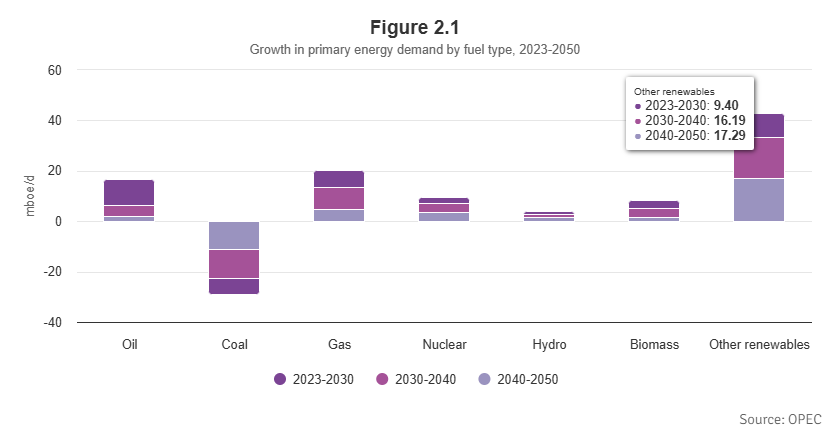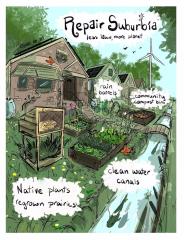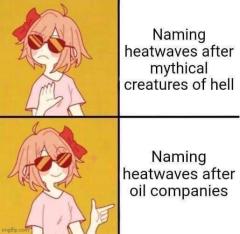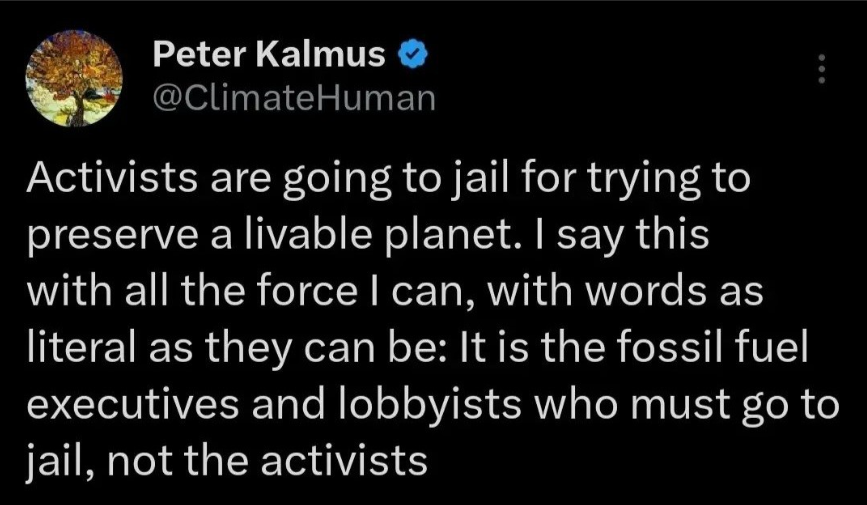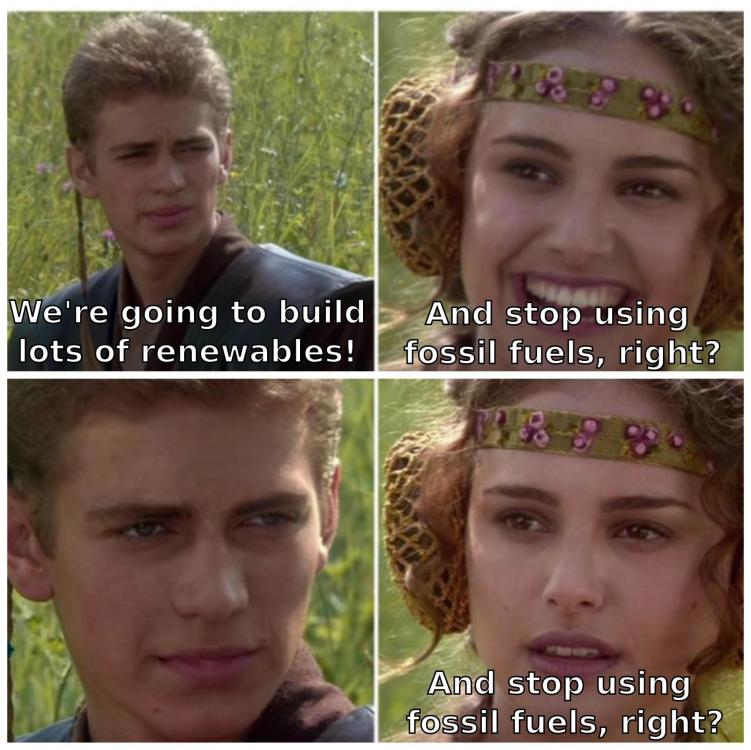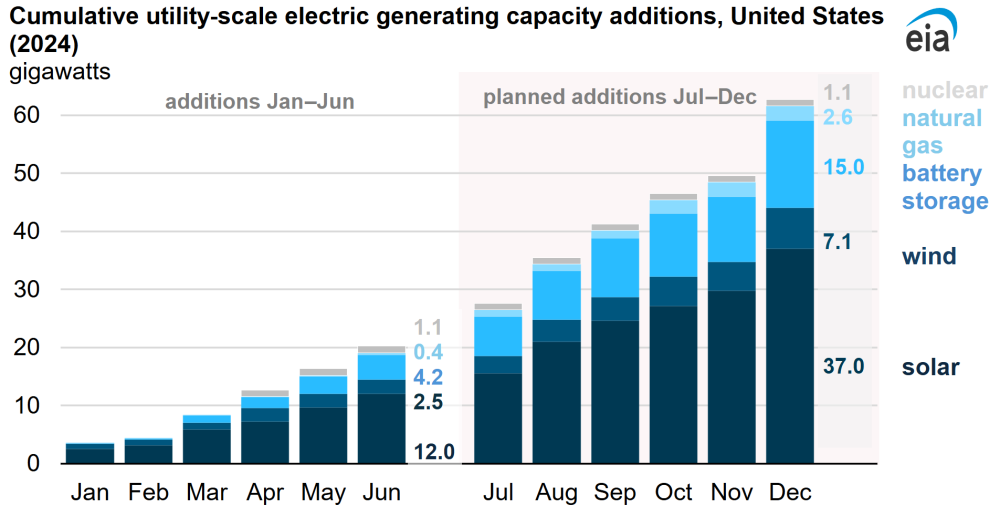-
Posts
2,912 -
Joined
-
Last visited
-
Days Won
60
Content Type
Profiles
Environment News
Forums
Blogs
Gallery
Events
Everything posted by Simon
-
I might not agree with everything he has said or done, but I still have huge respect for Captain Paul Watson and his movement.
-
- video
- paul watson
-
(and 4 more)
Tagged with:
-
In a not so distant future, the feature that lets you publish status updates on Green Blog will be completely removed from this community. When that happens, all previously published status updates will be removed and will not be viewable any more. We'll let you know in this topic when this happens so that you can be prepared. If you want to save your status updates, you can find them by going to your profile and pressing on the button "See my activity". And if you want some of your status updates to still be viewable here on Green Blog, you could consider posting relevant status updates in one of our many forums.
-
- green blog
- announcement
-
(and 1 more)
Tagged with:
-
If there are going to be climate-justified subsidies for owning electric cars, there should be subsidies for not owning cars at all. Discuss.
-
- cars
- electric cars
-
(and 1 more)
Tagged with:
-
Sometime during this past summer, the electric mower broke down, and our lawn wasn't cut for a really long period - and it was great! The small plot of lawn was quickly filled with flowers and various grass species. And it started to teem with life. First with lots of butterflies, bees, and insects. Then we noticed how more and more small birds came to visit. I guess to hunt for food and play around in the long grass. Even a hedgehog came to visit us most nights! It's amazing how little effort was required to bring back nature and wild life. The photo below shows how it looked just after a couple of days without moving the lawn. Have you tried something similar?
-
We have made a change in how you sign in to your Green Blog account. Instead of signing in to your account using your display name, you're now only able to log in with your email address that you used when you signed up for a Green Blog account. We've made this change in an effort to improve the security of your Green Blog account. Being able to log in in using a display name can represent a security weakness, as display names are public information. And malicious users may attempt to log in to your account with common passwords until they find an account for which the passwords work.
-
You’re not supposed to pick them up, why else are they called leaves
-
This is outrageous! When Bayer acquired Monsanto back in 2018, the manufacturer promised that it would make Roundup safer by removing the cancer-linked glyphosate from its weed-killer products by 2023. But an analysis, by Friends of the Earth, of the new Roundup shows that the weed killer is actually 45 times more toxic to human health. "With the new formulations of Roundup, Bayer had the opportunity to make us safer, but it did the opposite," Kendra Klein, deputy director of science for Friends of the Earth, said in a press release. "Bayer's willingness to deceive the public and disregard our health as it continues to cash in on the Roundup brand name is outrageous." The analysis shows that the cancer-linked glyphosate remains in Roundup and that it contains new and even more dangerous chemicals: Read the full report here.
-
This past August, the world's largest floating wind turbine, the OceanX, was installed on the open sea off Hong Kong, China. The OceanX is unique because it's the first ever platform that's been successfully built with two wind turbines on it. The dual-turbine has a total capacity of 16.6 MW and is expected to produce 54,000 MWh annually, which is enough to supply electricity to 30 000 homes. And it's absolutely huge! The OceanX is installed on a floating platform in the shape of a Y and reinforced with high-tension cables, it weighs about 16,500 tons, and reaches 219 metres at its highest point and has a maximum width of about 369 metres in the air. The OceanX wind turbine can resist wind speeds of up to 161 mph (260 km/h) and waves as high as 98 feet (30 meters) in Category 5 hurricane conditions. And what's even more impressive is that it can still generate electricity under such harsh circumstances. And yes, it has already managed to withstand a "super typhoon".
-
- hong kong
- wind power
- (and 8 more)
-
Meteorologist John Morales broke down in tears while giving his forecast for Hurricane Milton's progress on WTVJ in South Florida. Watch: Excerpt: "It is an incredible, incredible hurricane. The pressure has dropped with..." He looks down at his screen and continues in a shaky voice: "... it has dropped by 50 millibars. In ten hours." His voice breaks. The faster the air pressure in a hurricane drops, the faster it strengthens. "I apologize. It's just terrible." In an interview afterward, he told the New York Times that he began to cry out of shock at the hurricane's rapid development, compassion for the victims, and ultimately over his frustration at humanity's failure to reduce global warming, which is behind the increasingly extreme weather. "To see what I've known would happen [to] unfold before your very eyes when you've been trying to warn people about this and urging action on climate and not getting enough of that — it's just frustrating," he later said to People. Amazing, we're at that time in history when meteorologists cries over climate change on TV...
-
- meteorologist
- hurricane milton
- (and 5 more)
-
-
- climate change
- climate delay
-
(and 3 more)
Tagged with:
-
OPEC claimed in its annual World Oil Outlook (WOO) that there was "no peak oil on the horizon" and that phasing out oil was a "fantasy". The Saudi-led oil cartel concluded in its report that oil and gas make up well over half of the global energy mix today and, according to their assessment, the demand for oil and gas will continue to increase until at least 2050. For oil alone, OPEC expects to see demand reaching over 120 million barrels a day by 2050. "What the Outlook underscores is that the fantasy of phasing out oil and gas bears no relation to fact," OPEC Secretary General Haitham Al Ghais said. "A realistic view of demand growth expectations necessitate adequate investments in oil and gas, today, tomorrow, and for many decades into the future," he added. OPEC expects that the demand for all energy sources will continue to increase, with the exception of coal. And while the largest increase is expected to come from renewable energy sources, mainly wind and solar, the share of oil and gas in the energy mix will remain high. According to the report, oil will remain the largest with a total share at above 29 percent in 2050. Following renewables, OPEC expects that natural gas will have the second-largest increase. Coal demand is forecast to decline due to stringent national climate and energy policies, the report concludes. Future energy demand (mboe/d = million barrels of oil equivalent a day): Renewable energy sources will grow by 43 mboe/d (expanding from 9.6 mboe/d in 2023 to 52.4 mboe/d in 2050). Natural gas will grow by 20.5 mboe/d. Oil will grow by by 16.7 mboe/d. Coal will decline by almost 29 mboe/d between 2023 and 2050. The increased demand for energy is driven by a rising world population and a growing demand from primarily India and other non-OECD countries. The strongest energy demand will come from petrochemicals, road transportation and aviation, the report assesses. Obviously, the reports' forecast is completely contrary to previous assessment from the International Energy Agency, which projects that the demand for oil will peak as early as this decade thanks to renewable energy and electric cars. Just last month, IEA Executive Director Fatih Birol told news media that the demand for oil is slowing down. He attributed this decline in oil to the growth of electric cars and the weakening of the Chinese economy. In 2023, Birol said that "the peak in fossil fuel demand is moving even closer" and that the transition to clean energy is accelerating. In a few days, IEA's annual flagship report, World Energy Outlook, will be released. We'll see then what kind of projections IEA will make of future energy demand and growth - and if it's in line with OPEC's grim projections.
-
Almost 200 land defenders and climate activists were murdered last year. And environmental activists are increasingly facing tougher suppression and harassment from governments in Western countries. Nearly 200 environmental activists around the world were murdered in 2023, according to a new report by the organization Global Witness. But the real number of murdered activists is most likely much higher. For the second year in a row, Colombia tops the list of countries where most climate activists and land defenders are murdered. Last year, 79 activists were killed in the country. Brazil, Honduras and Mexico were next in line. These four countries alone made up more than 70 percent of all recorded killings globally. The report, which has been released yearly since 2012, shows that Latin America remains the most dangerous region with 85 percent of the total 196 murders. But the authors of the reports notes that findings are conservative and likely incomplete. For example, in all of Africa, Global Witness recorded only four deaths and consequently warned that their figure was likely a "gross underestimate" due to difficulty in collecting information. In addition to murder, activists are also subject to "enforced disappearances and abductions," tactics which are particularly used in both the Philippines and Mexico. "We are facing difficulties in returning to our homes and communities. We are still experiencing surveillance, red-tagging, and intimidation," said Jonila Castro, a Filipino activist who was abducted by the Philippines military in 2023 and currently facing criminalization, the report said. Environmental activists are also being silenced and suppressed by legislation in several countries. The report highlights Western countries where the situation for climate activists has become increasingly tougher in recent years. The report points out the USA, EU, and the UK as examples of countries and regions which have introduced harsher legislation, penalties and "draconian levels of surveillance" for environmental protesters and activists. But it's not just governments and politicians that are actively suppressing environmental activists. The report notes that media institutions also play "a major role in tainting mainstream perceptions of those protesting against climate breakdown." In January 2024, the UN Special Rapporteur on Environmental Defenders under the Aarhus Convention, Michel Forst, emphasised his distress at observing the disparagement of environmental and climate defenders by the mainstream UK media and politicians. The result, he says, is “a significant chilling effect on civil society and the exercise of fundamental freedoms.” We've all seen how environmental activists and protesters are being portrayed by mainly right-leaning politicians and various media outlets as extremists and terrorists that must be harshly dealt with, and how they gleefully post on social media with sick enjoyment whenever environmental protesters face brutality and violence from both fellow civilians and law enforcement. If you want a fresh example, just look how human rights activists and anti-war protesters are being suppressed by Germany and other Western governments right now. These heavy-handed police tactics and anti-protest laws will most likely also be used to suppress environmental protesters and activists. Make no mistake, if democratic governments can suppress activists that are protesting against a genocide today (They are trying to silence people who are protesting a genocide. A genocide! What happened to us?), they will have no qualms about suppressing climate activists using the very same heavy-handed treatment tomorrow. Another report, by Climate Rights International, builds upon this and exposes Western governments for their apparent double-standard. The report details how democratic Western governments are increasingly using harsh, vague and punitive measures to crack down on climate protests in their own countries, while they are criticising similar tactics used by more authoritative governments and countries in the global South. “Governments too often take such a strong and principled view about the right to peaceful protest in other countries – but when they don’t like certain kinds of protests at home they pass laws and deploy the police to stop them,” said Brad Adams, director at Climate Rights International. The report highlights how Australia, Germany, France, the Netherlands, Sweden, the UK and the US frequently criticise regimes in developing countries for not respecting the right to protest peacefully. But back home, these countries' governments are increasingly suppressing and cracking-down on climate activists. These governments have themselves responded to non-violent climate protests with mass arrests and draconian new laws that have resulted in long prison sentences. In the UK, climate activists now face longer prison sentences than rapists and far-right rioters. The report also shows how politicians - and the media - have been labelling the protesters as hooligans, saboteurs and even "ecoterrorists". Governments around the world are not doing enough to stop greenhouse gas emissions from rising rapidly. Climate change is accelerating and not slowing down. We are clearly losing the fight against climate change. But rather than taking urgent measures to rapidly reduce the use of fossil fuels and halt ecological collapse, our governments are instead suppressing and stopping those who are bravely raising the alarm by taking part in non-violent protests and civil disobedience. The worse climate change gets, the more the status quo powers will escalate their crack-downs and violence against climate activists in a futile effort to cling to power and maintain order in a dying world. Dark times are ahead of us. Cover photo by Joël de Vriend.
-
Political comic by Harry Burton in the Irish Examiner. Juxtaposition of illustration of iconic photo of Phoebe Plummer and Anna Holland, two Just Stop Oil activists – both young white women, one with pink hair, the other black, both wearing Just Stop Oil t-shirts and jeans – pictured in front of the painting after they threw tomato soup at Vincent van Gogh’s Sunflowers at the National Gallery in London, with the caption “arrested!” And a similar framing of Benjamin Netanyahu, the genocidal war criminal prime minister of Israel, in front of framed maps of Gaza and Lebananon drenched in blood, holding a tiny Israeli flag in his hand and wearing a Just Try Stop Me t-shirt, captioned “at large!”
-
A Just Stop Oil protester shouted “Shame on you” at a judge after she was found guilty along with three other campaigners of taking part in a protest which brought traffic in central London to a standstill (BBC). "You are criminalising people who are fighting for your futures. Shame on you, judge."
She's spot on.
-
Trots omfattande möten och aktiviteter i FN, EU, på nationella planet, inom forskningen och opinionsbildning fortsätter klimathotet att förvärras globalt, i Europa och nationellt, också i Sverige. Är detta förhållande oundvikligt? Vad behöver göras för att bryta och vända trenden? Vad kan FN, EU, Sverige och andra aktörer göra? Ända sedan FNs klimatkonferens om klimatet i Köpenhamn 2009 har ABF Stockholm och Klimataktion ordnat ett årligt seminarium inför FN-konferensen för att diskutera situationen och vad som kan göras. 2024 års klimatkonferens (COP 29) ordnas i Baku, Azerbajdzjan 11-24 november. https://www.facebook.com/events/1591855754690657 Medverkande Nina Ekelund, generalsekreterare näringslivsnätverket Hagainitiativet Naghmeh Nasiritousi, lektor vid Linköpings universitet, forskare vid utrikespolitiska institutet, UI Sverker Sörlin, professor, KTH, författare och debattör Anders Wijkman, hedersordförande Romklubben, tidigare bl a europaparlamentariker. Samtalsledare Pia Björstrand, talesperson, Klimataktion. Tid och plats 17 oktober kl 18.00 Katasalen, ABF-huset, Sveavägen 41 Entré 90 kr ordinarie, 70 kr för studerande och pensionärer Biljetter hittar du här https//billetto.se/e/internationell-utblick-klimathotet-biljetter-1040718 Arrangeras av ABF Stockholm och Klimataktion Adress ABF Stockholm Sveavägen 41 Stockholm, Sweden Sweden
-
The Greek port city of Volos has declared a state of emergency after being completely flooded with dead fish. Pictures show how huge amounts of fish have accumulated along the coast and in rivers. The stench is described as unbearable and tourists have left the area. “There are millions of dead fish all the way from Lake Karla and 20 kilometers (12 miles) eastward,” Anna Maria Papadimitriou, the deputy regional governor of the central Thessaly area, told state-run television, AP News report. Authorities in Greece have linked the mass die-off to extreme weather fluctuations due to climate change. The mass die-off occurred after a nearby lake flooded last year, followed by a severe drought this summer that forced freshwater fish into the sea, where they cannot survive. The stench must be unbelievably bad. We will probably see more and more of these mass die-off events as the effects of climate change worsens.
-
In the US, natural gas for electricity production has usually outpaced renewables. But for the first time ever, renewables will clearly outpace natural gas in 2024. Newly published data from the US Energy Information Agency (EIA), as reported by Ars Technica, shows that renewable energy sources such as wind, solar, and batteries were each installed at a pace that easily dwarfs new natural gas generators during the first half of the year. According to the EIA data, around 20 GW of new electricity capacity was added in the US during the first half of this year, with solar accounting for about 60 percent of that. Solar power is seemingly growing at an extremely rapid pace, even in the US. Which really should come to no surprise for those of us whom been following the news about renewables lately. Following the rapid - and seemingly unstoppable - expansion of solar power are batteries. In the first half of 2024, about 4.2 GW of battery capacity was added in the US. As Ars Technica explains: "Batteries are treated as the equivalent of a generating source by the EIA since they can dispatch electricity to the grid on demand, even if they can't do so continuously." By comparison, wind power in the US is being added at a much slower pace. According to the EIA, only about 2.5 GW of the new capacity being added during the first half of 2024 was from wind power. Despite this seemingly small addition to the overall capacity from wind power, nuclear energy accounted for even less. Only 1.1 GW of new nuclear capacity was added, and there are no plans to add any new nuclear capacity in 2024 or even during the rest of this decade. This should also come to no surprise to anyone, nuclear power is simply too expensive and takes too long to build for it to play a meaningful part in decarbonizing our energy grid. Besides all the dangers and waste issues with nuclear energy, we simply don't have the time to wait for nuclear energy! In comparison, natural gas accounted for only 400 MW, or about 2 percent, of the total new capacity that was added in the US. And renewables will continue to outpace fossil fuels. EIA calculates that a bit over 60 GW of new electricity capacity will be added to the US energy grid by the end of this year. Solar power will account for about 37 GW, batteries 15 GW, and wind power will land at around 7.1 GW. EIA expects that natural gas will only account for about 2.6 GW. "Throw in the contribution from nuclear, and 96 percent of the capacity additions of 2024 are expected to operate without any carbon emissions. Even if you choose to ignore the battery additions, the fraction of carbon-emitting capacity added remains extremely small, at only 6 percent." It's obviously great to see renewables overtake fossil fuels in the US. And hopefully this trend will continue for decades to come. But reducing the usage of existing sources of fossil fuels is just as important as adding new capacity from clean and renewable energy sources. So what does the EIA data tells us about that? Well, a reduction in the overall capacity from fossil fuels is happening, but it's going slowly. Too slow. During the first half of 2024, around 5.1 GW of capacity was retired from the US grid. And most of that was from fossil fuel-powered sources, including 2.1 GW of coal capacity and 2.7 GW of natural gas.
-
- coal
- solar power
- (and 10 more)
-
Iconic toymaker Lego will replace oil-based plastics used in their bricks with recycled and renewable plastics by 2032, Reuters and Financial Times reports. Lego plans to gradually reduce the amount of oil-based plastic in the bricks with renewable resin. Lego's resin suppliers are using bio-waste such as cooking oil or food industry waste fat as well as recycled materials to replace virgin fossil fuels in plastic production. This greener resin is usually much more expensive than traditional "virgin plastic", which the large majority of plastic products worldwide are made from. According to Lego's calculations, it will cost them 70 percent more to make the toys with renewable resin. But the company says they have no plans to push the costs onto their customers and rise their prices. "This means a significant increase in the cost of producing a Lego brick," said Lego CEO Niels Christiansen to Reuters. "With a family-owner committed to sustainability, it's a privilege that we can pay extra for the raw materials without having to charge customers extra," Christiansen said. Other toy makers have also started to include more plant-based or recycled materials in some of their plastic toys. Toymaker Hasbro is one of those but they haven't set any firm targets on plastic use. And toymaker Mattel plans to use only recycled, recyclable or bio-based plastics in all products by 2030.
-
Forget the claim that climate change only affects future generations. As you are probably aware of, the effects of our pollution crisis can already be felt around the world. Just take this example. According to a new report from the UN agency the International Labor Organization (ILO), almost 70 percent of the world's workers are already exposed to excessive temperatures at work. According to the report, this is a nine percent increase since the year 2000. And the problem will continue to worsen as global warming accelerates, the ILO-report warns. "As the world continues to grapple with rising temperatures, we must protect workers from heat stress year-round. Excessive heat is creating unprecedented challenges for workers worldwide year-round, and not only during periods of intense heatwaves, said ILO Director-General Gilbert F. Houngbo in a press release. The report finds that workers in Africa (93 percent), followed by the Arab states (83.6 percent) and Asia and the Pacific (74.7 percent) are among the worst affected by increasingly intolerable temperatures. But regions in Europe and North America that have previously been unaccustomed to extreme heat will also face increased risks. The reports detail how these regions have already witnessed the largest rise in workplace injuries from heat stress since the year 2000, with increases of 33.3 per cent and 16.4 per cent respectively. The findings in this report build on a previous UN-report, published in April earlier this year, which indicated that excessive heat alone causes 22.85 million occupational injuries and the loss of 18,970 lives each year. “If there is one thing that unites our divided world, it’s that we’re all increasingly feeling the heat. Earth is becoming hotter and more dangerous for everyone, everywhere. We must rise to the challenge of rising temperatures – and step up protections for workers, grounded in human rights,” explained the UN Secretary General, Antonio Guterres.
-
- united nations
- un report
- (and 10 more)
-
Hi Jerry and welcome to the community!




